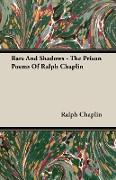Bars and Shadows - The Prison Poems of Ralph Chaplin
BücherAngebote / Angebote:
CONTENTS PS INTRODUCTION, 5 MOURN NOT THE DEAD, 1 3 TAPS, 14 NIGHT IN THE CELL HOUSE, 15 PRISON SHADOWS, 16 PRISON REVEILLE, 1 7 PRISON NOCTURNE, 18 THE WARRIOR WIND, 19 To FREEDOM, 21 THE VISION MAKER, 22 DISTANCES, 23 PHANTOMS, 24 SEVEN LITTLE SPARROWS, 25 SALAAM, 26 THE WEST is DEAD, 29 UP FROM YOUR KNEES, 30 THE EUNUCH, 31 I. W. W. PRISON SONG, 33 To FRANCE, 34 VlLLANELLE, 35 WESLEY EVEREST, 36 THE INDUSTRIAL HERETICS, 37 BLOOD AND WINE, 38 THE RED GUARD, 40 THE RED FEAST, 41 THE GIRLS WHO SANG FOR Us, 43 To EDITH, 44 SONG OF SEPARATION, 45 To MY LITTLE SON, 46 ESCAPED, 47 RETROSPECT, 48 LIBRARY INTRODUCTION I. Ralph Chaplin is serving a twenty year sentence in the Federal Penitentiary, not as a punishment for any act of violence against person or property, but solely for the ex pression of his opinions. Chaplin, together with a number of fellow prisoners who were sentenced at the same time, was accused of taking part in a conspiracy with intent to obstruct the prosecution of the war. To be sure the Government did not produce a single witness to show that the war had been obstructed by their activities but it was argued that the agitation which they had carried on by means of speeches, articles, pamphlets, meetings and organizing campaigns, would quite naturally hamper the country in its war work. On the face of their indictments these men were accused of interfering with the conduct of the war in reality they were sent to jail because they held and expressed certain beliefs. As a member of the Industrial Workers of the World, Ralph Chaplin did his part to make the organization a suc cess. He wrote songs and poems he made speeches he edited the official paper, quotSolidarityquot. He looked about him saw poverty, wretchedness and suffering among the work ers contrasted it with the luxury of those who owned the land and the machinery of production studied the problem of distribution and decided that it was possible, through the organization of the producers, to establish a more scientific, juster, more humane system of society. All this he felt, intensely. With him and his fellow-workers the task of free ing humanity from economic bondage took on the aspect of a faith, a religion. They held their meetings wrote their literature made their speeches and sang their songs with zealous devotion. They had seen a vision they had heard a call to duty they were giving their lives to a cause the emancipation of the human race. When the war broke out in Europe, with millions of working-men flinging death and misery at one another, men like Chaplin, the world over, regarded it as the last straw. Was it not bad enough that these exploited creatures should be used as factory-fodder Must they be cannon-fodder too Why should they fight to increase the economic power of German traders of British manufacturers The war was a capitalist war between capitalist nations. What interest had the workers in these nations in their winnings or in their losses So ran the argument. The I. W. W. was not primarily an anti-war organization. In theory it had abandoned political activity to devote itself exclusively to agitation and organization on the field of in dustry. Practically its funds and its energies were expended upon industrial struggles. Long before the war, the I. W. W. had made itself known and feared for its conduct of strikes its free speech fights, and its ability to put the sore spots of American industrial life on the front page of the daily press and to keep them there until the people had become aroused to the wrongs that were being perpetrated. It was in the domain of industry that the I. W. W...
Folgt in ca. 10 Arbeitstagen




